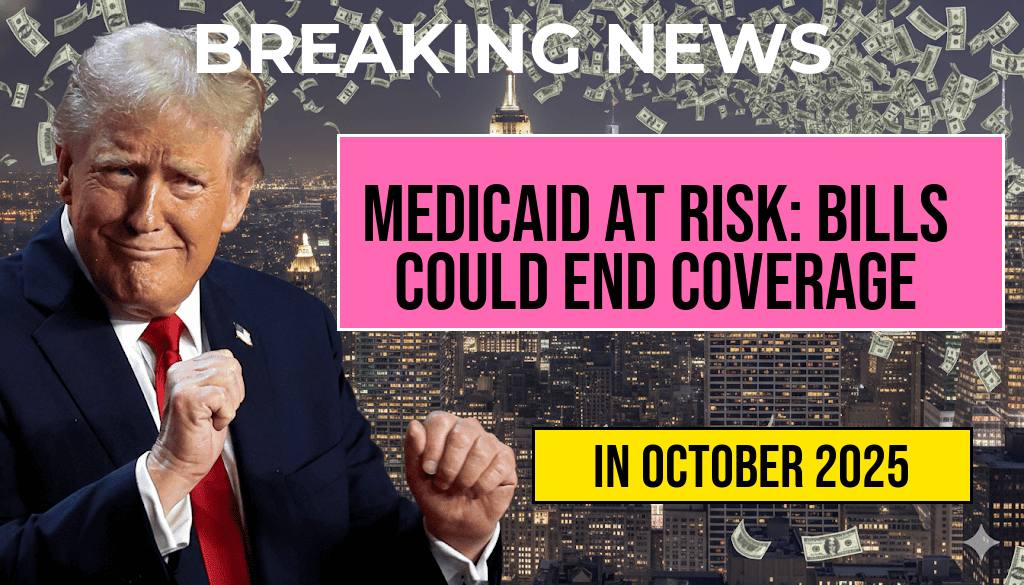Medicaid at Risk: CBO Warns Millions Could Lose Coverage Over Potential $1,000 Emergency Room Bills
Amid ongoing debates over healthcare policies, a recent report from the Congressional Budget Office (CBO) highlights a looming threat to millions of Medicaid recipients. The agency warns that an increase in out-of-pocket expenses—specifically, emergency room bills reaching approximately $1,000—could result in a significant number of individuals losing their Medicaid coverage. The report underscores concerns that financial barriers, if not addressed, may discourage access to necessary care, leading to worse health outcomes and increased long-term costs for the healthcare system. As policymakers grapple with proposed reforms, the potential for millions to face coverage loss raises questions about the future of Medicaid’s safety net role and the socioeconomic implications of rising patient liabilities.
The Underlying Concerns: Financial Barriers and Coverage Loss
The CBO analysis indicates that recent proposals to modify Medicaid’s coverage and cost-sharing structures could inadvertently push vulnerable populations into financial hardship. Specifically, the report emphasizes that emergency room visits—often essential for urgent health issues—may become prohibitively expensive for many enrollees if their bills average around $1,000. Such costs can lead to a cascade of consequences: individuals may delay or avoid necessary care, accrue unpaid bills, and ultimately face coverage termination due to unpaid balances or administrative hurdles.
Experts warn that the risk is particularly acute for low-income families who already operate with tight budgets, making unforeseen medical expenses a significant financial strain. The potential loss of coverage not only jeopardizes immediate health needs but also exacerbates disparities in healthcare access, especially among marginalized communities.
How the Proposed Changes Could Impact Medicaid Enrollment
The CBO report assesses various policy scenarios, including increased deductibles, co-payments, and stricter eligibility criteria. Under such measures, an estimated millions of Medicaid beneficiaries could find themselves unable to afford emergency care, leading to a higher likelihood of disenrollment from Medicaid programs. The following table summarizes key projections:
| Scenario | Estimated Number of Enrollees at Risk of Coverage Loss | Average Emergency Room Bill Assumed |
|---|---|---|
| Increased Co-payments to $1,000 | Approximately 3 million | $1,000 |
| Stricter Eligibility Checks | About 2.5 million | N/A |
| Higher Deductibles for All Enrollees | Nearly 2 million | $1,000 |
While these figures are estimates, they highlight the tangible risk that increasing out-of-pocket costs could disproportionately affect the most vulnerable populations, including seniors, individuals with chronic conditions, and low-income families.
Broader Implications for Healthcare Access and Costs
The potential for coverage loss over high emergency room bills extends beyond individual health. When patients avoid or delay care due to cost concerns, their conditions often worsen, leading to more complex and expensive treatments down the line. Emergency departments may bear the brunt of this shift, experiencing increased patient volumes with more severe illnesses. This dynamic could raise overall healthcare costs, challenge hospital resources, and strain emergency services.
Furthermore, gaps in coverage and delayed care can contribute to higher rates of preventable hospitalizations and mortality, especially among populations already facing health disparities. The Centers for Medicare & Medicaid Services (CMS) emphasizes that Medicaid’s primary goal is to promote access to preventive and emergency care, reducing long-term costs and improving health outcomes. Policies that threaten coverage stability undermine these objectives.
Policy Responses and Public Concerns
Legislators and advocacy groups are raising alarms about the potential ramifications. Critics argue that increasing cost-sharing without safeguards effectively penalizes those with the greatest health needs. Some lawmakers advocate for protections that cap out-of-pocket expenses or provide subsidies to offset emergency bills, aiming to maintain Medicaid’s role as a safety net.
Meanwhile, healthcare providers warn that the proposed changes may lead to a surge in uncompensated care, further straining hospital finances and community health resources. The American Hospital Association (AHA) has called for policies that prioritize affordability and access, emphasizing that health coverage should not be contingent on one’s ability to pay large sums during emergencies.
Looking Ahead: Balancing Cost Control with Access
The debate over Medicaid reform continues as policymakers seek a balance between controlling costs and ensuring equitable access. The CBO’s warning serves as a critical reminder that financial barriers—particularly sudden, large bills—can undermine the program’s core mission. As discussions advance, stakeholders are calling for strategies that protect vulnerable populations from catastrophic expenses while promoting sustainable healthcare funding models.
For more information on Medicaid policies and ongoing legislative developments, visit Kaiser Family Foundation and Congress.gov.
Frequently Asked Questions
What is the main concern regarding Medicaid coverage highlighted in the article?
The primary concern is that millions of Americans could lose their Medicaid coverage due to potential $1,000 emergency room bills, which may lead to financial hardship and loss of healthcare access.
How does the potential $1,000 emergency room bill impact Medicaid recipients?
The article warns that such high out-of-pocket costs could cause Medicaid recipients to face financial strain, potentially resulting in loss of coverage or abandonment of necessary healthcare services.
What role does the Congressional Budget Office (CBO) play in this issue?
The CBO has issued a warning that policy changes or increased healthcare costs might lead to a significant reduction in Medicaid enrollment and coverage, affecting millions of Americans.
Are there any specific policy changes mentioned that could influence Medicaid coverage?
While the article does not specify exact policy changes, it suggests that funding adjustments and cost-sharing requirements could contribute to the potential loss of coverage for many Medicaid beneficiaries.
What can individuals do to protect themselves from potential loss of Medicaid coverage due to emergency bills?
Individuals should stay informed about policy updates, explore financial assistance programs, and seek preventive care to minimize emergency expenses, thereby reducing the risk of losing Medicaid coverage.










